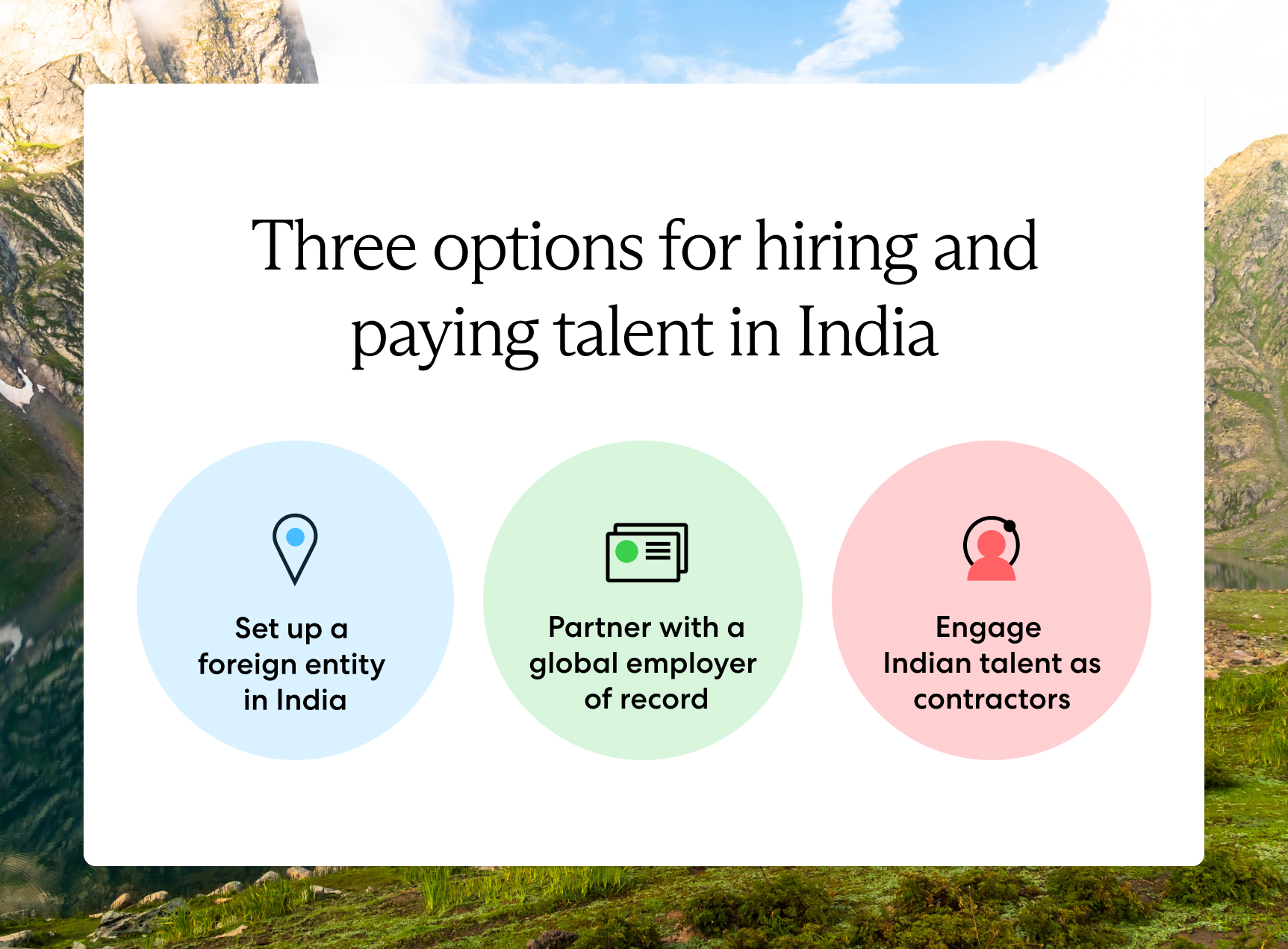Hiring employees in India positions global companies for success. India is full of talent—with over 1.4 billion people, it is the second-largest country by population and the second-largest English-speaking country after the United States.
India is also one of the top hubs for remote workers. It offers a growing talent pool in the information technology (IT) sector, making it an attractive opportunity and savvy choice for U.S. companies looking to grow their workforce and international presence.
Interested in hiring employees in India from another country? Learn your hiring options below, India employment laws to consider, and how to avoid compliance risks.
Can a U.S. company hire in India?
Yes, a U.S. company can hire employees in India. However, there are distinct differences between the employment laws in the U.S. and India, so it’s critical to understand the hiring nuances and compliance risks that come with targeting international talent.
How do U.S. companies hire employees in India?
There are three ways to hire Indian workers: set up a legal entity in the country, partner with an employer of record, or hire and pay contractors.
The option you choose when deciding how to hire employees in India depends on various factors, including time, cost, the number of remote employees you wish to hire, and your company’s long-term goals.

1. Set up a foreign entity in India
If you plan to hire a large team in India or establish a long-term presence in the country, you can set up a legal entity in India by creating a local branch or foreign subsidiary. Doing so allows your U.S. company to handle hiring and employment logistics internally, resulting in fewer employment costs in the long run.
Keep in mind that setting up an entity requires extensive knowledge of India’s legal, corporate, and payroll regulations. Your company must research the laws, handle complex HR tasks, and manage complicated payroll. If done incorrectly, your company may risk noncompliance.
Plus, entity establishment is costly and time-consuming and may not be worthwhile if you only plan to hire a small number of employees in India.
2. Partner with an employer of record in India
Partnering with an employer of record (EOR) allows you to quickly hire employees in India without establishing a foreign entity. An EOR operates as a legal entity with a team of experts well-versed in India’s employment laws and regulations.
An EOR also handles hiring, onboarding, payroll, benefits administration, taxes, and talent relocation on your behalf to ensure local compliance and support for your Indian workforce. Meanwhile, you maintain control of all day-to-day management responsibilities.
Learn more: What Is an Employer of Record (EOR)?
3. Engage contractors in India
Rather than set up an entity or hire employees in India, companies may choose to hire and pay contractors in India for short-term projects or services. An international contractor provides their services as a self-employed individual, which allows for more flexibility and cost savings for a company.
Companies can target specialized expertise that falls out of their regular scope of work while saving time and money that would otherwise be spent on training, administration, and payroll.
However, companies that hire contractors in India risk misclassifying talent. While you may consider them contractors, Indian employment law may see them as employees. Misclassification leads to penalties like employee back pay, legal fines, and reputational damage. This guide goes into greater detail on the subject of misclassification below.
How much does it cost to hire an employee in India?
The cost of hiring an employee in India is, at a minimum, 16.75% of the employee’s base salary. This is because the employer must contribute 12% of their employee’s base salary to the Employees’ Provident Fund (EPF) and 4.75% to the Employees’ State Insurance (ESI).
Interested in hiring employees in India? Use our employee cost calculator below to get reliable insights into employee costs and payroll contributions in India:
Also, keep in mind the costs related to recruiting, onboarding, or additional employee benefits you may provide your talent in India.
What to know before hiring employees in India
Indian labor law is complex, making it vital that global companies learn and comply with country-wide employment regulations.
India employment laws and practices
Here are several employment laws and practices that apply to companies hiring talent in India:
- National minimum wage. India does not have a national minimum wage—rather, it varies depending on state and industry. For example, the minimum monthly wage for a highly skilled worker (a pharmacist or chemist) in the state of Karnataka is 15,423.40 INR ($187.86). However, a person in the same profession would earn a minimum wage of 13,234 INR ($161.19) per month in the state of Goa.
- 13th-month pay. It’s common in India for companies to give bonuses to their employees, either based on performance or profit. The additional 13th-month pay is only included as wages under the Payment of Wages Act (POWA) if it’s included in the employee's contract.
- Overtime. Employees in India are entitled to overtime at a rate of twice their normal wages. Typically, overtime requirements only apply to factory workers who work beyond nine hours per day or 48 hours per week.
- Paid time off. Employees in India are entitled to 15 days of leave per year, but this varies depending on the state. However, employees can also take 10 additional days of casual leave, where an employee may opt not to work that day without having to apply for leave in advance.
- Sick leave. India does not have a national sick leave policy, but some states have sick leave allowances. However, these allowances may be grouped into casual leave guidelines.
- Parental and maternity leave. Women are entitled to paid maternity leave when they’ve worked at least 80 days in the previous 12 months within the same company. They are entitled to 26 weeks. Paternity leave is not mandated nationally, but some companies provide one to two weeks of leave for new fathers.
- Holidays. Holidays vary by state in India, but most recognize 10 public holidays per year. Of those 10, three are mandatory national holidays, but the rest are chosen by employers from a list provided by the state.
Learn more information on India’s employment laws.
India payroll taxes
Indian employment law requires that employers contribute to various payroll schemes, including state insurance, pensions, a provident fund, and health and education funding.
Employer contributions
Employers must contribute to the following India payroll schemes:
- Employees’ Provident Fund (EPF): For companies that employ at least 20 workers, employers contribute 12% to the EPF.
- Employees’ Pension Scheme (EPS): The EPS is part of the EPF; when employers contribute 12% to the EPF, 8.33% goes to the EPS.
- Employees’ State Insurance (ESI): Employers that have at least 10 employees contribute 4.75% to the ESI.
Learn more in our complete guide to payroll and taxes in India.
Compliance risks when hiring employees in India
Because employment laws and regulations differ in each country, there are compliance risks when hiring employees in a foreign market. When hiring in India, it’s important to understand the different regulations and how they apply.
Employment law variance in different states
India has 29 states, and the employment laws vary from state to state. Along with taxes, other factors that differ between states include the minimum wage, sick leave, and overtime rates.
As discussed above, even public holidays vary by state, so it’s important to know the particulars of employment in the state where you’re hiring Indian workers.
Incorrect payroll contributions
There are differences between U.S. and Indian employer contributions, which directly affect payroll items like your employee’s take-home pay and social security.
There are severe penalties for incorrect payroll contributions in India, including back pay, tax arrears, and fines. Along with monetary setbacks, payroll compliance errors can impact employee morale.
Permanent establishment
If you have an ongoing and stable presence in India, you may have a permanent establishment and are therefore liable to local corporate taxes. To be considered a permanent establishment, a business must regularly conduct business in the country, have a fixed or permanent location there, and wholly or partially operate its business through that venue.
If your company generates revenue from a fixed location in India, failure to understand and identify permanent establishments puts your company at risk of noncompliance penalties like paying back unpaid taxes, legal issues, interest, and employer liabilities.
Misclassification risk
If you decide to hire and pay contractors instead of hiring employees in India, you may risk improper worker classification. Misclassification risks include fines, legal issues, and employee entitlement back pay.
When engaging with an international contractor in India for short-term services or projects, a company should learn the necessary classification, tax laws, and reporting for both the U.S. and India. A Form W-8BEN determines the proper tax reporting and withholdings for international contractors and is completed by the contractor to document their status as a foreign worker.
However, understanding how to classify your workforce in a foreign market is still a complicated process, so many companies opt to work with an experienced partner with in-country insight into locally compliant contracts, reporting, and payroll to avoid misclassification.
Read our complete guide to employee and contractor misclassification.
Immigration requirements
You may encounter a situation where you need to hire talent in India, but they are not residents or citizens of the country. Additionally, you may need to relocate foreign talent to live and work in India.
In these cases, you must know the immigration criteria to ensure your employees live and work in India legally.
To gain work authorization in India for your employee, you must first have a legal presence in the country, and then you must assist your employee with obtaining an Employment visa. Alternatively, an EOR can assist with all relocation and immigration requirements on your behalf to simplify the process and mitigate risk.
Hire employees in India compliantly with Velocity Global
Building a remote team in India is an exciting and rewarding opportunity if done compliantly. Partnering with an experienced partner like Velocity Global eliminates the hassle of setting up an entity and helps you navigate India’s local employment laws with ease.
Our Employer of Record (EOR) solution handles hiring, payroll, benefits administration, HR support, and compliance on your behalf so you can focus on running your business.
Contact Velocity Global to learn how our solutions can help you quickly and compliantly engage the talent pool in India and more than 185 countries around the world.



